some record in matlab code
2015-07-24 19:34
489 查看
(shift+f3)可以切换英文大小写!!!
1—add path in the matlab:
2—- matlab function handle
这是一种间接调用函数的形式,但是很高效,
handle = @functionname
handle = @(arglist)anonymous_function
3—about the sparse web and CS
http://www.cnblogs.com/daniel-D/p/3222576.html
这里面引用的coursera 上面的内容

http://www.cvchina.info/2010/06/01/sparse-representation-vector-matrix-tensor-1/
http://www.cvchina.info/tag/%E5%8E%8B%E7%BC%A9%E6%84%9F%E7%9F%A5/
4—Hadamard product (matrices)
For two matrices of the same dimensions, there is the Hadamard product, also known as the element-wise product, pointwise product, entrywise product and the Schur product.[24] For two matrices A and B of the same dimensions, the Hadamard product A ○ B is a matrix of the same dimensions, the i, j element of A is multiplied with the i, j element of B, that is:
\left(\mathbf{A} \circ \mathbf{B}\right){ij} = A{ij}B_{ij},,
The Frobenius inner product, sometimes denoted A : B, is the component-wise inner product of two matrices as though they are vectors. It is also the sum of the entries of the Hadamard product. Explicitly,
\mathbf{A}:\mathbf{B}=\sum_{i,j} A_{ij} B_{ij} = \mathrm{vec}(\mathbf{A})^\mathsf{T} \mathrm{vec}(\mathbf{B}) = \mathrm{tr}(\mathbf{A}^\mathsf{T} \mathbf{B}) = \mathrm{tr}(\mathbf{A} \mathbf{B}^\mathsf{T}),
where “tr” denotes the trace of a matrix and vec denotes vectorization. This inner product induces the Frobenius norm.
5—image reconstruction toolbox
http://web.eecs.umich.edu/~fessler/code/
6——Nonuniform Fast Fourier Transforms (NUFFT)
some website:
http://research.engineering.uiowa.edu/cbig/content/accurate-nufft-using-optimized-interpolator-and-scale-factors
下图在1D数据中,显示了FFT与NUFFT的区别:
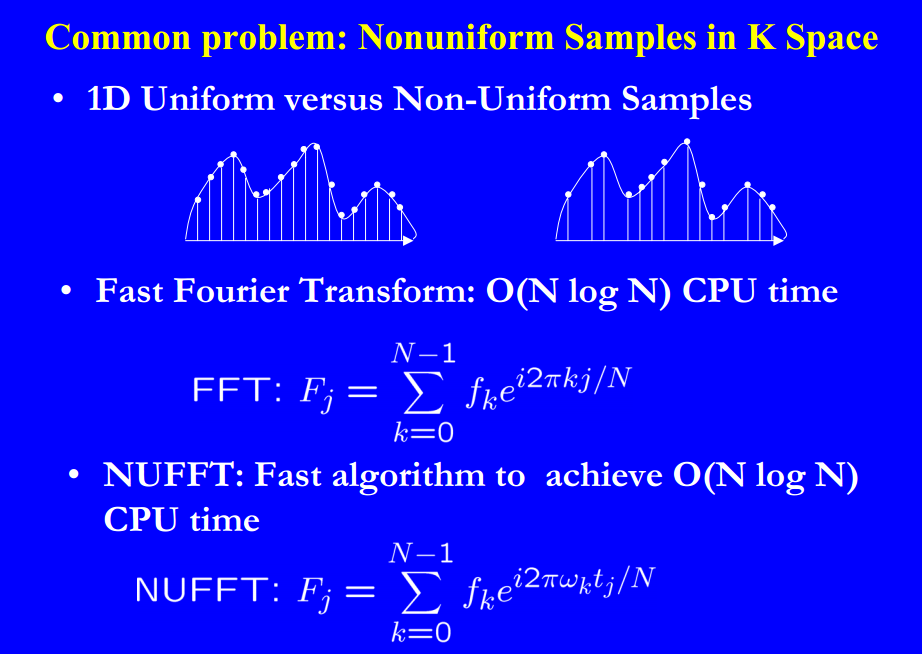
一个均匀采样,一个非均匀采样
下图显示在医学图像处理中的采样方式:
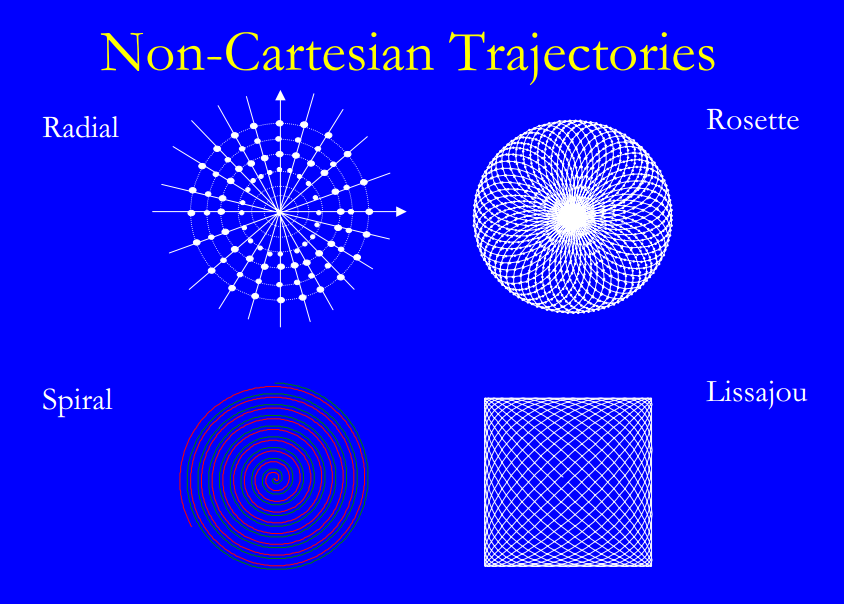
下图在图像处理中的对比残差:
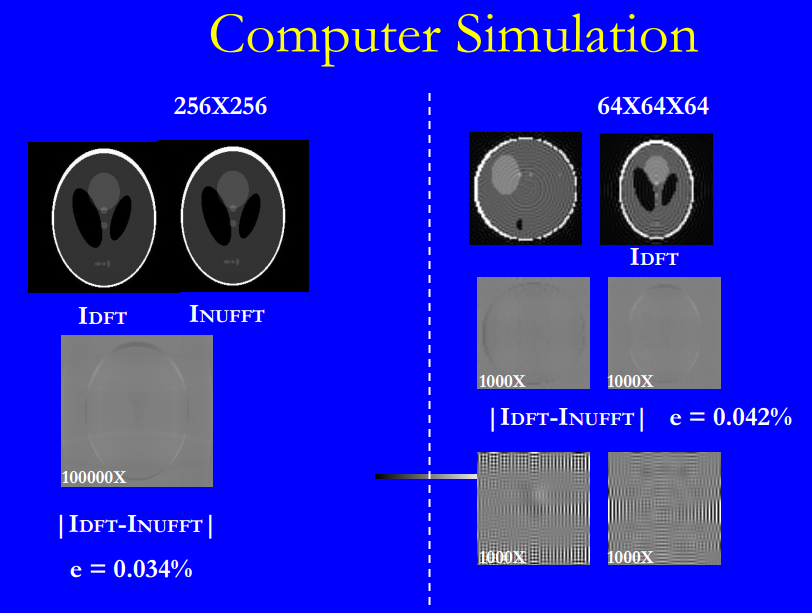
上图中的残差计算,没有明白为啥右下角的图像时那种条纹。。。。
重在应用MRI
7—-sparse coding 和 sparse representation 的区别
稀疏编码是获得稀疏表示的一种途径-zhihua zhou
S R 广泛应用于 图像恢复、去模糊、inpainting、物体检测等等,最近几年非常热,大量文章出现。
最早的一篇文章是1996年的Nature 上的一篇文章
emergence of simple
在线性表达上进行了稀疏约束,得到了一下表征图像固有特征的基函数(不一定正交) localized\ oriented \ bandpass
Elad的一个slide 有详细讲解SP的问题及理论,非常好
Ecole_Polytechnique_MMSE_April_2009.ppt
稀疏表示的模型如图
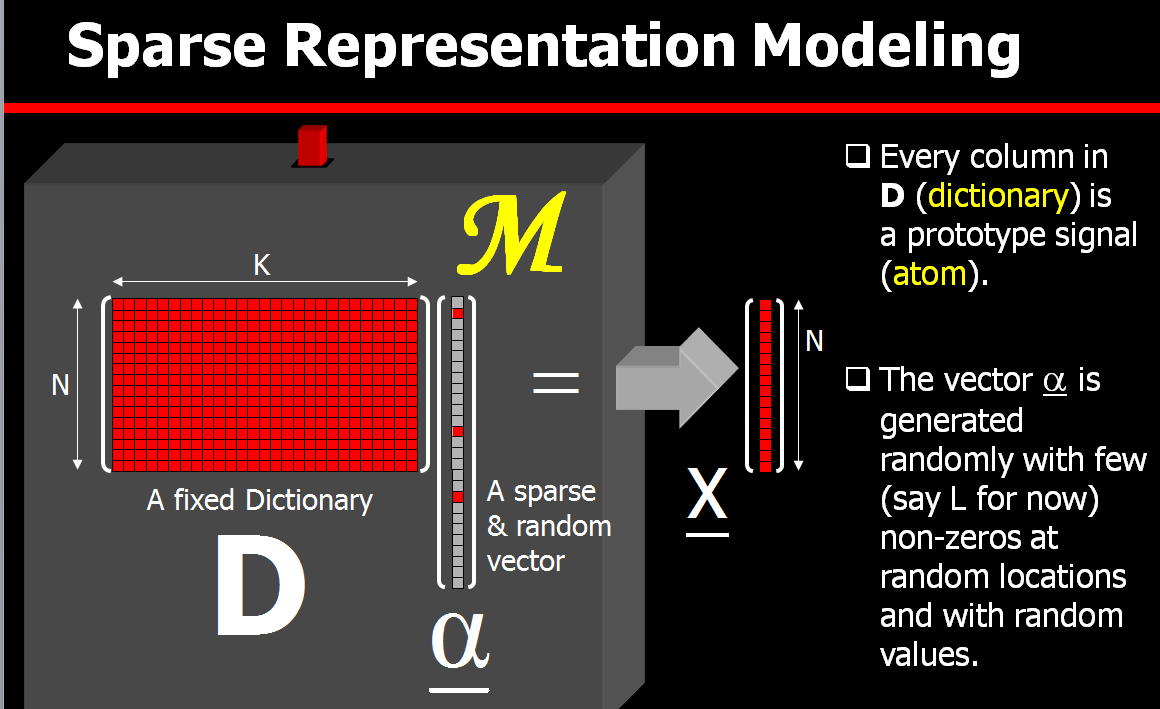
另外,最近稀疏表示的论文,可以参考最近出来的一个survey,A Survey of Sparse Representation: Algorithms and Applications, 内容比较详尽,总结了SP发展中的sparse 约束的5种不同范数类型:
L0-范数
Lp-范数
L1-范数
L2,1-范数
L2-范数
将求解的上述不同约束的SP算法归结了4类,
greedy strategy approximation,常见的为Matching pursuit, Orthogonal Matching Pursuit
constrained optimization
proximity algorithm-based optimization
homotopu algorithm-based sparse representation
http://arxiv.org/pdf/1506.07515v1.pdf
8—–steepest descent method 最速梯度下降法
在看FISTA的方法的时候,发现algorithm 的步骤跟程序稍微有一点不匹配,按照流程修改之后就发现是错的,原来隐藏在里面一个梯度和导数的关系
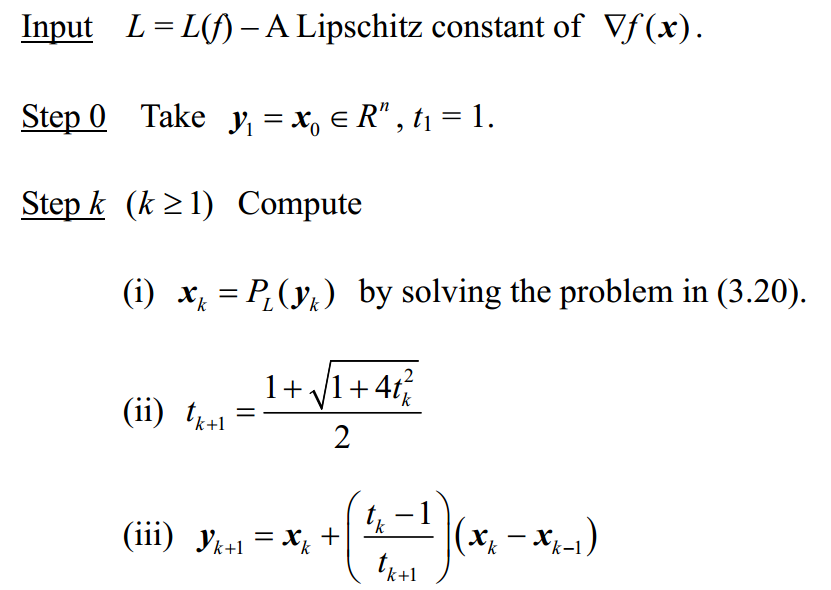
在程序中的5-6行,改的是错误的
原来是用了最速下降法(steepest descent method),最速下降的方向是负梯度方向:-g(k)/|g(k)|
归结为: x(k+1)=x(k)-a*g(k),g(k)是x(k)的梯度
具体参考博客
自己在优化方面需要好好看,程序都看不懂!!
关于范数性质中,成立的两个等式


第二个等式是LP问题,可以求解
常用: KKT condition
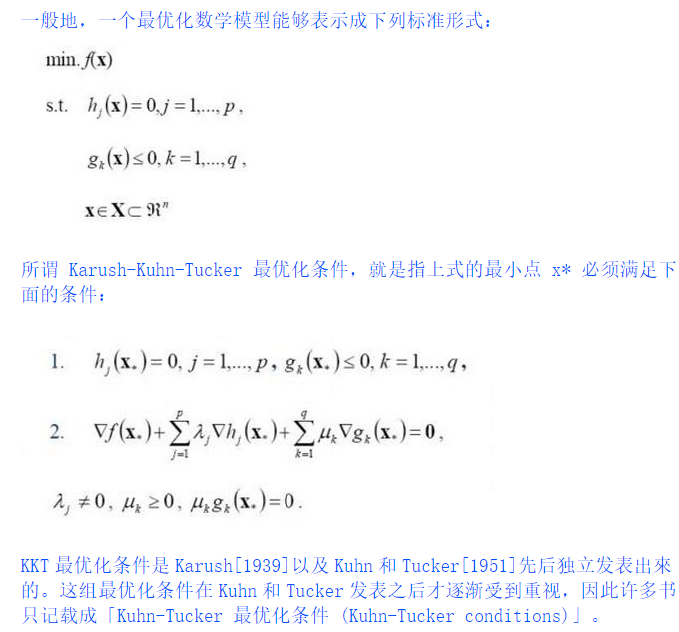
1—add path in the matlab:
addpath('utilities');
addpath('solver');2—- matlab function handle
这是一种间接调用函数的形式,但是很高效,
handle = @functionname
handle = @(arglist)anonymous_function
sqr = @(x) x.^2; sqr(20)
3—about the sparse web and CS
http://www.cnblogs.com/daniel-D/p/3222576.html
这里面引用的coursera 上面的内容

http://www.cvchina.info/2010/06/01/sparse-representation-vector-matrix-tensor-1/
http://www.cvchina.info/tag/%E5%8E%8B%E7%BC%A9%E6%84%9F%E7%9F%A5/
4—Hadamard product (matrices)
For two matrices of the same dimensions, there is the Hadamard product, also known as the element-wise product, pointwise product, entrywise product and the Schur product.[24] For two matrices A and B of the same dimensions, the Hadamard product A ○ B is a matrix of the same dimensions, the i, j element of A is multiplied with the i, j element of B, that is:
\left(\mathbf{A} \circ \mathbf{B}\right){ij} = A{ij}B_{ij},,
The Frobenius inner product, sometimes denoted A : B, is the component-wise inner product of two matrices as though they are vectors. It is also the sum of the entries of the Hadamard product. Explicitly,
\mathbf{A}:\mathbf{B}=\sum_{i,j} A_{ij} B_{ij} = \mathrm{vec}(\mathbf{A})^\mathsf{T} \mathrm{vec}(\mathbf{B}) = \mathrm{tr}(\mathbf{A}^\mathsf{T} \mathbf{B}) = \mathrm{tr}(\mathbf{A} \mathbf{B}^\mathsf{T}),
where “tr” denotes the trace of a matrix and vec denotes vectorization. This inner product induces the Frobenius norm.
5—image reconstruction toolbox
http://web.eecs.umich.edu/~fessler/code/
6——Nonuniform Fast Fourier Transforms (NUFFT)
some website:
http://research.engineering.uiowa.edu/cbig/content/accurate-nufft-using-optimized-interpolator-and-scale-factors
下图在1D数据中,显示了FFT与NUFFT的区别:

一个均匀采样,一个非均匀采样
下图显示在医学图像处理中的采样方式:

下图在图像处理中的对比残差:

上图中的残差计算,没有明白为啥右下角的图像时那种条纹。。。。
重在应用MRI
7—-sparse coding 和 sparse representation 的区别
稀疏编码是获得稀疏表示的一种途径-zhihua zhou
S R 广泛应用于 图像恢复、去模糊、inpainting、物体检测等等,最近几年非常热,大量文章出现。
最早的一篇文章是1996年的Nature 上的一篇文章
emergence of simple
在线性表达上进行了稀疏约束,得到了一下表征图像固有特征的基函数(不一定正交) localized\ oriented \ bandpass
Elad的一个slide 有详细讲解SP的问题及理论,非常好
Ecole_Polytechnique_MMSE_April_2009.ppt
稀疏表示的模型如图

另外,最近稀疏表示的论文,可以参考最近出来的一个survey,A Survey of Sparse Representation: Algorithms and Applications, 内容比较详尽,总结了SP发展中的sparse 约束的5种不同范数类型:
L0-范数
Lp-范数
L1-范数
L2,1-范数
L2-范数
将求解的上述不同约束的SP算法归结了4类,
greedy strategy approximation,常见的为Matching pursuit, Orthogonal Matching Pursuit
constrained optimization
proximity algorithm-based optimization
homotopu algorithm-based sparse representation
http://arxiv.org/pdf/1506.07515v1.pdf
8—–steepest descent method 最速梯度下降法
在看FISTA的方法的时候,发现algorithm 的步骤跟程序稍微有一点不匹配,按照流程修改之后就发现是错的,原来隐藏在里面一个梯度和导数的关系

在程序中的5-6行,改的是错误的
ck = yk - 2*Li*A'*(A*yk-yn); thk1 = (max(abs(ck)-alp,0)).*sign(ck); tk1 = 0.5 + 0.5*sqrt(1+4*tk^2); tt = (tk-1)/tk1; yk = thk1 +tt*(thk1-thk); %yk = thk1 -tt*(thk1-thk);% this is right tk = tk1; thk = thk1;
原来是用了最速下降法(steepest descent method),最速下降的方向是负梯度方向:-g(k)/|g(k)|
归结为: x(k+1)=x(k)-a*g(k),g(k)是x(k)的梯度
具体参考博客
自己在优化方面需要好好看,程序都看不懂!!
关于范数性质中,成立的两个等式


第二个等式是LP问题,可以求解
常用: KKT condition

相关文章推荐
- poj 3264 st算法
- UFLDL Exercise:Sparse Autoencoder
- Non-local Sparse Models for Image Restoration
- 稀疏文件(sparse-files)生成汇总
- Matlab学习笔记 sparse与full函数
- 【MongoDB学习笔记25】MongoDB的索引类型
- 内核工具 – Sparse 简介
- 稀疏矩阵及其应用案例
- [CodeVersion--GIT]sparse checkout
- Git如何检出指定目录或文件
- matlab——sparse函数和full函数(稀疏矩阵和非稀疏矩阵转换)
- Python SciPy Sparse模块学习笔记
- sparse文件简介
- 降维 Dimensionality Reduction
- Sparse Coding
- 面试必备:SparseArray源码解析
- Sparse Representation---Yall1---Your algorithms for $L1$
- sparse Coding的C++代码——详细注释版
- tensorflow 中 sparse_softmax_cross_entropy_with_logits 与 softmax_cross_entropy_with_logits区别
- SparseArray不适合数据量大的情况的原因
